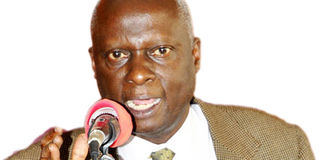Dilemma of Uganda Airlines salute and push for Kiswahili as national language

Joseph Bossa
What you need to know:
- Fear. There should be no fear that Kiswahili will destroy the local indigenous languages. People will remain free to speak and use their “mother” languages among themselves.
The occasions and policies which I agree on with NRM are becoming very few. But I am in full agreement with the government on its decision to validate Kiswahili as Uganda’s national language.
In fact, the only fault is that it has taken too long to reach it. Ideally, that decision and its implementation should have been taken some 34 years ago when the NRM government took power. At the time, a lot of people felt NRM could do no wrong and those who expected nothing good from NRM were not in a position to resist.
My fear though is NRM’s proven tendency to introduce the right policies for the wrong reasons and to implement badly some good policies.
Upon launching ‘Bombadier airlines’, as some people cheekily call Uganda Airlines, it was realised that the salutes; “abeyibo ladies and gentlemen, welcome aboard” or “agandi ladies and gentlemen,” or “tusanyuse okkulaba ladies and gentlemen,” as we await a national language to emerge, will not be good enough. Something had to be done urgently, and what better option than Kiswahili.
A common language brings cohesiveness among the people of a community. The complaint that they were forced to speak English at school instead of being let free to speak their mother tongues, was completely misplaced.
Apart from getting the students proficient in English by practicing it, in a multi-ethnic setting, it helped to promote togetherness among students. It prevented formation of language or tribal-based cliques in the school body.
There should be no fear that Kiswahili will destroy the local indigenous languages. People will remain free to speak and use their “mother” languages among themselves. But Kiswahili will be the default language as it were, in the sense that if you are communication with someone whom you don’t know or whose mother language you are not aware of or you cannot speak, you speak to that person in Kiswahili.
Diligent people will speak at least three languages; their mother language, Kiswahili and English with Kiswahili being the default language if possible.
In Sweden, Denmark and Holland, most people below 50 years old speak English in addition to the national Language. Therefore, in shops, banks and hospitals, one who speaks English finds it easy to get by.
But what has been the hindrance of validation of Kiswahili in the past in Uganda?
The natives of the most-widely spoken Luganda language feared that Kiswahili would swallow up their language. It won’t. It was also argued that Kiswahili was unpopular because it was a language of violence deployed in commission of crime by frightening the victims out of their wits who did not understand it. The crime perpetrator would shout: “Lala chini! (lie down), fungua mulango! (open the door!), leta pesa! (bring money!). The good news is that once the victim knows the language, those words are neutralised and cease to frighten him or her.
Kiswahili may not be the language with the biggest number than any other number language in Africa – Yoruba in Nigeria is – but Kiswahili takes its speaker farther and wider in Africa, covering the African Great Lakes region and other parts of eastern and south-eastern Africa (close to the Atlantic ocean). Like English, Kiswahili has shown its ability to absorb words from other languages and to lend its words to other languages. That flexibility has enable young Nairobians to fabricate a language called “sheng”. No one group of people can claim to own it, with the chauvinism that goes with it.
Part of the problem with the introduction of Kiswahili was the lack of popularity of the governors, from the colonial administrators to some independence leaders. While it may not be said that the present regime is universally loved, that problem is ironically attenuated in areas where its introduction would find the most resistance.
It was tempting to think that the resurrection of Uganda Airlines was moved by the desire for Uganda to be like its neighbours in terms of having a “national carrier”.
If Rwanda has it, Tanzania has it and Kenya has it, why doesn’t Uganda has it? But it has given birth to the objective which has been long in incubation: the national language for Uganda, which will remain alive long after Uganda Airlines has probably re-died.
This article was published posthumously. Joseph Bossa died of cancer on October 1.




